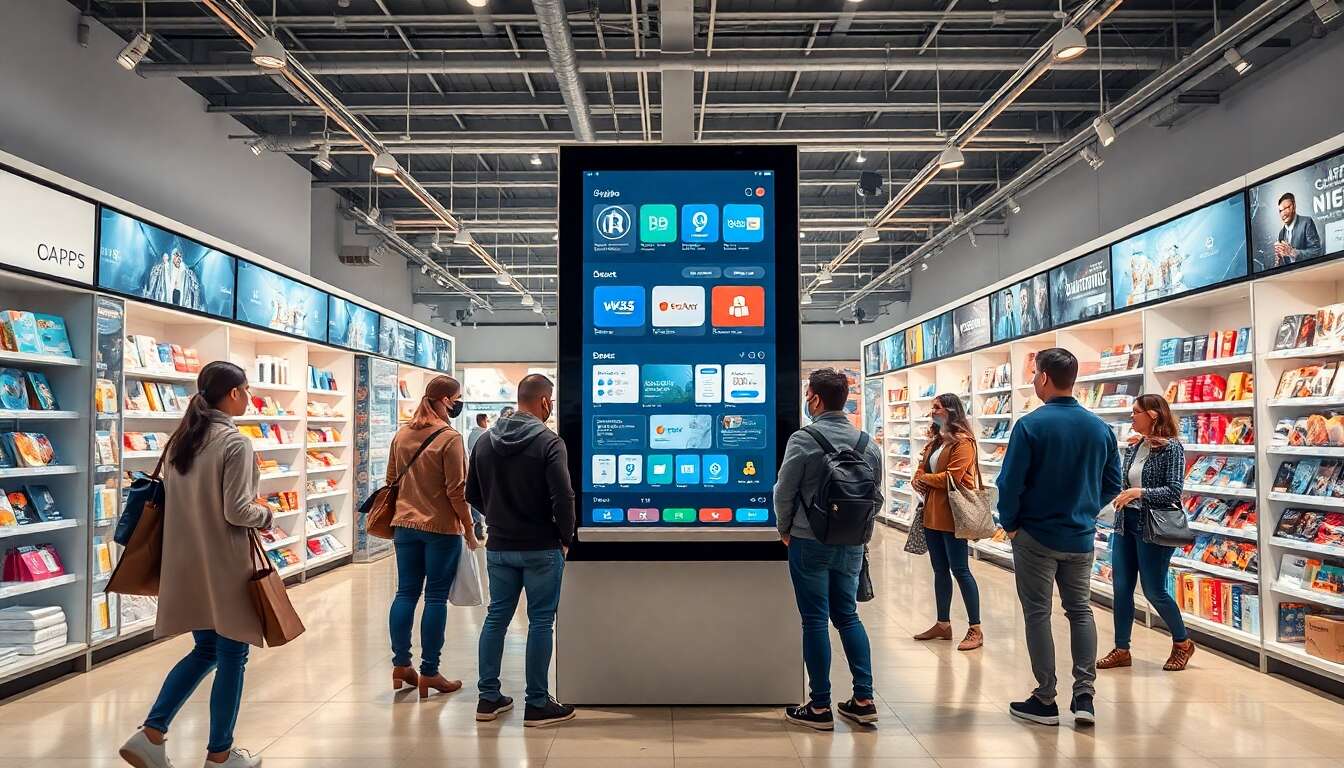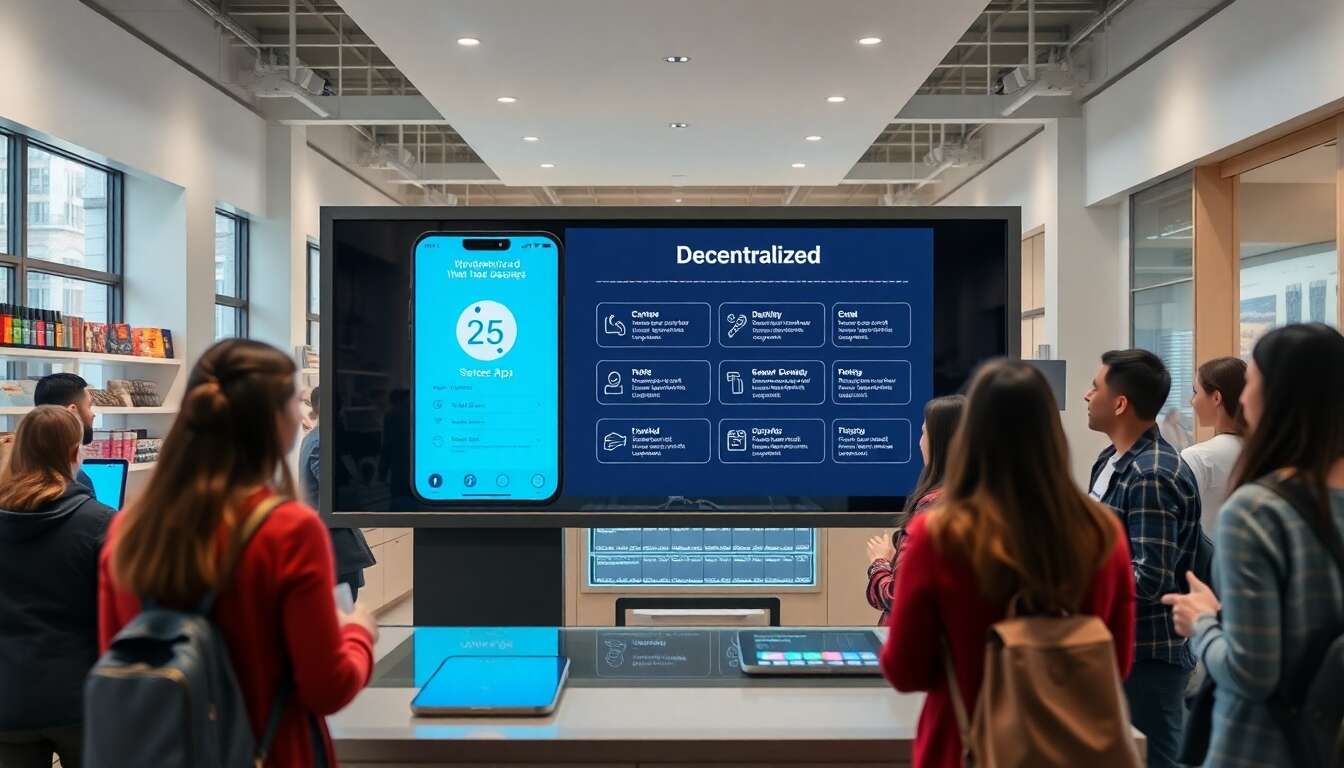In an era marked by digital transformation, the retail industry is exploring new technologies to enhance customer experiences and improve operational efficiency. One such innovation is the adoption of decentralized applications, or DApps, in-store. These applications leverage blockchain technology to offer a more secure, transparent, and user-centric approach to digital transactions and data management. As retailers face increasing pressure to protect consumer data and provide seamless shopping experiences, DApps emerge as a viable solution.
Understanding decentralized applications
Defining DApps
Decentralized applications, commonly referred to as DApps, are applications that run on a blockchain or peer-to-peer network of computers instead of a single server. This decentralization shifts control away from a centralized authority, providing users with more autonomy and security. Unlike traditional applications that rely on a central entity for data management and operations, DApps distribute these functions across a network, reducing the risk of data breaches and ensuring transparency.
Key Characteristics of DApps
Several characteristics define DApps: open-source code, decentralized data storage, and cryptographic security. These features ensure that DApps are not only secure but also flexible and reliable.
- Open-source code: Being open-source allows developers to contribute to and improve the application, ensuring continuous innovation.
- Decentralized data storage: Data is stored across a network of computers, enhancing security and reducing vulnerability to attacks.
- Cryptographic security: DApps use cryptographic protocols to secure transactions and user data, providing an added layer of protection.
The understanding of DApps sets the stage for exploring their benefits in the retail sector, particularly in enhancing store operations and customer engagement.
The benefits of DApps for stores

Enhanced Security and Trust
One of the primary advantages of implementing DApps in-store is the enhanced security they offer. Unlike centralized systems, which are prone to hacking and data breaches, DApps utilize blockchain technology to ensure data integrity and security. This is crucial for retailers, as it builds customer trust and protects sensitive information.
Operational Efficiency and Cost Reduction
DApps streamline various retail processes through automation and smart contracts. This can significantly reduce operational costs and increase efficiency by eliminating the need for intermediaries in transactions. Additionally, DApps can automate tasks such as inventory management and payment processing, allowing retailers to focus on customer service and experience.
Improved Customer Engagement
With DApps, retailers can offer personalized and engaging shopping experiences. By leveraging the transparency and data-sharing capabilities of blockchain, retailers can tailor offers and promotions to individual customer preferences, enhancing loyalty and satisfaction.
The benefits of DApps are not confined to operational improvements but also extend to customer experience and engagement, a topic that warrants further exploration.
The impact of DApps on customer experience
Personalization and Customization
DApps enable retailers to provide personalized shopping experiences by securely analyzing consumer behavior and preferences. This allows for targeted promotions and customized recommendations, creating a more engaging shopping journey for customers.
Faster and More Secure Transactions
The use of smart contracts in DApps facilitates faster and more secure transactions. These contracts automatically execute transactions once predefined conditions are met, eliminating delays and reducing the risk of fraud.
Increased Transparency and Trust
By providing a transparent platform for transactions, DApps enhance consumer trust in retailers. Customers can verify transaction details and product authenticity, fostering a sense of security and confidence in their purchases.
The focus on customer experience naturally leads to a discussion on how DApps contribute to data security and privacy, a critical concern for both retailers and consumers.
Increased security and privacy with DApps

Data Protection and Privacy
DApps prioritize user privacy by allowing individuals to control their data. Unlike centralized systems that collect and store vast amounts of personal information, DApps grant users the ability to manage their own data and decide what to share. This reduces the risk of data exploitation and enhances privacy.
Resilience to Cyber Attacks
The decentralized nature of DApps makes them less vulnerable to cyber attacks. With data distributed across a network, it becomes significantly harder for hackers to compromise systems, providing retailers and consumers with peace of mind.
The emphasis on security and privacy paves the way for discussing the scalability and sustainability of decentralized solutions in retail settings.
Scalability and sustainability of decentralized solutions
Scalability Challenges and Solutions
While DApps offer numerous benefits, scalability remains a challenge. However, advancements in blockchain technology are addressing these issues, making DApps more viable for large-scale retail operations. Techniques such as sharding and layer-two solutions are being developed to enhance the scalability of DApps.
Sustainable Business Practices
DApps contribute to sustainability by reducing the carbon footprint associated with centralized data centers. By distributing data across a network, DApps require less energy for data processing and storage, aligning with environmentally conscious business practices.
The scalability and sustainability of DApps lead us to consider real-world examples of how retailers are successfully implementing these technologies.
Case studies: stores that have adopted DApps

Leading Retailers Embracing DApps
Several retailers have already begun integrating DApps into their operations, demonstrating the practical benefits of this technology. For instance, a well-known retail chain has implemented a blockchain-based loyalty program, allowing customers to earn and redeem points securely and efficiently.
Success Stories and Lessons Learned
These case studies highlight the advantages of DApps in retail, such as increased customer engagement, cost savings, and improved security. Retailers adopting DApps report enhanced customer satisfaction and loyalty, underscoring the technology’s potential to transform the industry.
The successful implementation of DApps by forward-thinking retailers illustrates the tangible benefits and potential of decentralized solutions, pointing to a promising future for the retail sector.
The adoption of decentralized applications in retail offers a comprehensive solution to many of the challenges faced by traditional systems. From enhancing security and privacy to improving customer experience and operational efficiency, DApps provide a robust framework for modern retail operations. As more retailers recognize the value of blockchain technology, the shift towards decentralized applications is likely to accelerate, driving innovation and growth in the industry.



